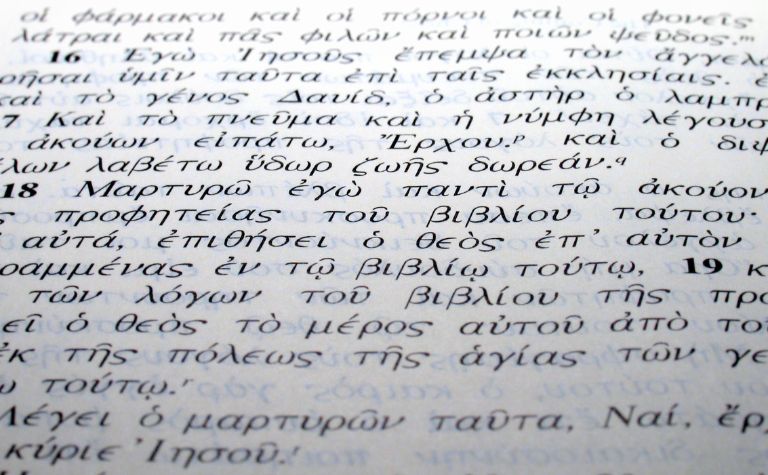Over 2,000 years ago, people who walked and talked with Jesus of Nazareth wrote the 27 books of the New Testament. The drive to preserve and spread Jesus’ teachings and stories about him led the authors to create a written record of their experiences and others. One question many people ask is, what language did the authors of the New Testament use?
The original language of the New Testament is Greek. The type of Greek that the writers used is “Koine” or “Hellenized Greek,” distinguished from Classical or Literary Greek. “Koine” means “common,” and “Hellenized” refers to the spread of Greek culture due to Alexander the Great.
When did biblical Greek emerge? What is unique about it? Why wasn’t the New Testament written in Hebrew like the Old Testament since many of the first Christians were Jewish? What does the military leader Alexander the Greek have to do with the New Testament? Keep reading to learn the answers to these questions and others.
Also, see Who Wrote the New Testament? to learn more.

The Emergence of Biblical Greek
Greek comes from the Proto-Indian-European language family, along with Latin, German, French, English, Russian, Italian, Spanish, and others.
Unfortunately, the first trace of the Greek language in human history is hard to detect because it occurred thousands of years before Jesus Christ, and no written records exist.
However, historians estimate that people first appeared in the region of present-day Greece about 3,000 years before Christ.
This period is likely the origin of a dialect unique to the region that became more distinct from its parent language over time.
Historians consider the first stage of the Greek language as the time before Homer, whose works like the Iliad date to the 8th century B.C.
| Stage | Period |
|---|---|
| Pre-Homer | 3,000 B.C. – 1,000 B.C. |
| Classical Greek | 1,000 B.C. – 330 B.C. |
| Koine Greek | 330 B.C. – 330 A.D. |
| Medieval Greek | 330 A.D. – 1453 A.D. |
| Modern Greek | 1453 – Present |
Why wasn’t the New Testament written in Hebrew?
Many people wonder why the New Testament was written in Greek if Hebrew is the language of the Old Testament. Additionally, New Testament writers quote the Old Testament hundreds, if not thousands, of times. Furthermore, Jewish people wrote most of the books in the New Testament.
Alexander the Great (356-323 B.C.), Macedon’s king and military leader, is the person most responsible for the New Testament being written in Greek. Alexander was neither Jewish nor Christian (he lived 300 years before Jesus), yet historians credit him with the formation of Koine Greek.
In his explanation of the emergence of Koine Greek, Bible scholar Daniel Wallace writes, “The Koine was born out of the conquests of Alexander the Great. First, his troops, which came from Athens as well as other Greek cities and regions, had to speak to one another. This close contact produced a melting-pot Greek that inevitably softened the rough edges of some dialects and abandoned the subtleties of others.”
He continues, “Second, the conquered cities and colonies learned Greek as a second language. By the first century CE, Greek was the lingua franca of the whole Mediterranean region and beyond.” [1]
Also, see How Many Chapters Are in the New Testament? to learn more.

What Does Koine Mean?
“Koine” means “common” or “shared.” It occurs in the New Testament though its appearance doesn’t directly refer to the Greek language (see example below). Nevertheless, it’s from the same word that the dialect gets its name.
| Greek word | κοινoς |
| Part of speech | adjective |
| Transliteration | koinos |
| Pronunciation | koy-nos |
| Definition | “common” |
| Example (Titus 1:4) | “common faith” |
Sometimes translations render the word “impure” or “unclean.” Yet, such translations don’t explicitly describe the Greek language.
However, they reveal that the semantic range of the Greek word “koine” includes ideas like unrefined or unsophisticated, which would also be descriptions of the dialect compared to Classical Greek.
What is Hellenization?
Koine Greek is also called “Hellenized” Greek. The term Hellenism describes the Greek culture’s impact on other societies because of Alexander.
It comes from the word “Hellas,” which is the word Greeks used to describe themselves. When Alexander conquered the known world during his lifetime, he took Greek culture with him because he thought it was superior to all others.
One historian explains, “Hellenism dates from early Greek culture but became dominant during the reign of Alexander the Great (336-323 B.C.). Alexander, tutored by Aristotle, believed that Greek philosophy offered the key to enlightenment for the barbarians… He pursued an intentional process of indoctrinating conquered nations on Hellenistic philosophy.” [2]
Alexander didn’t live to see the New Testament era. When he died, his empire was divided, and the Ptolemaic Dynasty in Egypt ruled Israel. Under their influence, education, and writing continued in Greek, even when Jewish revolts seized control in the region (e.g., the Maccabees).
What is the Septuagint?
One of the most significant signs of Hellenization among the Jews was the creation of the Septuagint, a Greek translation of the Old Testament. The prefix “sept-” refers to the tradition that 70 scholars worked on rendering the original Hebrew into Greek.
As a result, since many of the Jewish authors of the New Testament were educated under Hellenism, most quotations of the Old Testament are from the Septuagint.
Also, see What Language Was the Old Testament Written In? to learn more.

Classical vs. Koine Greek: Differences
Classical Greek is more sophisticated than Koine. As a melting-pot dialect, Koine Greek contained a simpler vocabulary and sentence structure. As a result, some of the unique features of other dialects vanished, creating a common language for ease of communication, particularly in battle.
| Classical Greek | Koine Greek |
|---|---|
| More refinement | Less refinement |
| More subtly | Less subtly |
| Richer vocabulary | Limited vocabulary |
| Complex sentences | Simple sentences |
| Frequent conjunctions | Fewer conjunctions |
| Indirect discourse favored | Direct discourse favored |
| Fewer direct descriptions | More direct descriptions |
| Fewer pronouns | More pronouns |
Greek scholar J. Gresham Machen reflects: “The New Testament writers have used the common, living language of the day. But they have used it in the expression of uncommon thoughts, and the language itself, in the process, has been, to some extent, transformed.”
He continues, “The cosmopolitan popular language of the Graeco-Roman world served its purpose in history well. It broke down racial and linguistic barriers. And at one point in its life, it became sublime.” [3]
Also, see Are there 46 Books in the Old Testament? to learn more.
References:
[1] Greek Grammar: Beyond the Basics by Daniel B. Wallace. p. 15.
[2] Holman Illustrated Bible Dictionary. p. 733.
[3] New Testament Greek for Beginners by J. Gresham Machen. p. 6.
Related Questions
Some historians believe that the Bible is the most-read book in history. They also say it's the best-selling book of all time. One reason for this is that despite having multiple authors, different...
Regular Bible reading is a valuable habit, as Scripture is God's message to people. However, the Bible's 66 distinct books, featuring various authors, settings, and themes, can make it challenging...
